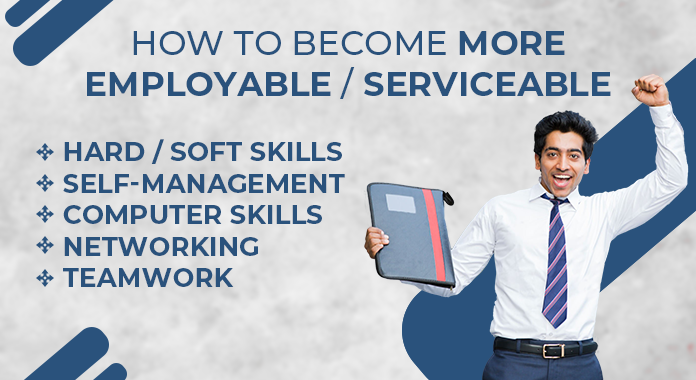How to Become More Employable.
If you are born poor, It’s not your mistake. If you live poor, It’s your mistake.
What is Employability?
A set of achievements – skills, understandings and personal attributes – that makes graduates more likely to gain employment and be successful in their chosen occupations, which benefits themselves, the workforce, the community and the economy.
Is not just about getting a job, it is about a broader set of skills and attributes that will enable a graduate to be successful throughout their working life.
Types of employability skills
Basically, there are 2 types of skills –
Hard skills
Hard skills are specific abilities, or capabilities, that an individual can possess and demonstrate in a measured way. Possessing a hard skill connotes mastery and expertise within the individual to perform a specific task or series of tasks to complete a job.
Soft skills
Soft skills, also known as common skills or core skills, are skills that are desirable in all professions. These include critical thinking, problem-solving, public speaking, professional writing, teamwork, digital literacy, leadership, professional attitude, work ethic, career management and intercultural fluency This is in contrast to hard skills, which are specific to individual professions.
Why are these skills Important?
These sets of job-readiness skills are, in essence, behaviours that are necessary for every job and are essential attitudes that enable you to grow in your career and also efficiently help you:
- connect with co-workers
- solve problems
- be a part of and understand your role within the team
- make responsible choices for your job and your career
- be independent and take charge of your career
Some of the Soft skills are:-
Some basic employability skills that are desired in employees are:
- Communication skills
- Leadership
- Problem-solving
- Teamwork
- Self-management
- Technology
- Computer Skills
- Strong Work Ethics
- Emotional Intelligence
- Networking
1. Communication
It is one of the most important personality traits and a soft skill that is much sought after for any employment. Effective use of the five elements of communication, which include the sender, receiver, message, medium and feedback helps to deliver a message with clarity. An employee with good communication skills helps the company to avoid any unnecessary misunderstandings and waste of time and in turn, helps to increase productivity.
Communication improves with practice. Maintain a positive expression and body language, listen carefully to others and think before you speak. Joining a club or being active on social media also helps to develop your communication skills.
2. Leadership
Leadership skills are important at every stage in an organisation. Employers lookout for candidates who possess this skill set. You can demonstrate your leadership skills if you can manage your team members well, motivate and train the staff to improve their work practices and set objectives or goals for the colleagues to share in the interest of the company.
5 Essential Leadership Skills and Practices
- Self-development
- Team development
- Strategic thinking and acting
- Ethical practice and civic-mindedness
- Innovation
3. Problem Solving
Problem-solving is the act of determining the issue, identifying the cause of the problem, selecting the best possible outcomes and implementing it.
Problem-solving skills can be developed by participating in brainstorming sessions, undertaking projects and research assignments and even solving puzzles.
Some of the steps of problem-solving are:
- Identify or define the issue
- Gather information
- Understand everyone’s point of view or interests
- List possible options and evaluate them
- Choose an option
- Implement a solution
4. Teamwork
- Teamwork as a skill refers to the ability to know your role in the team and work amicably with your teammates. Intense global competition makes teamwork especially important to achieve better productivity.
- It also increases your chances of being hired by an organisation to help reach the company goals more effectively. How employees work as a team has a direct effect on the organisation’s stability, innovation and productivity.
5. Self-Management
Self-management is the ability to organise and manage your work commitments consistently with minimal or no supervision and guidance. This skill also helps to save time, which curates efficiency.
Self-management skills can be developed by:
- Taking initiative and asking for greater responsibilities at work.
- Be accountable for your work and actions.
- Participation in volunteer work and managing your commitments.
6. Technology
Knowledge of technology is one of the leading skill sets that organisations look for when hiring staff. It helps employees to stay relevant and ahead of the competition. While the technical skills required for different jobs vary significantly across roles, some basic knowledge of technology is crucial in today’s workplace. Organisations value employees who can grasp the technology-based concepts and learn how to use them effectively.
Steps to further develop technology skills:
- Enrol in a course or online training
- Ask for extra on-job training
- Stay updated with the latest technology being used in the industry
- Try new apps and technology while listing the ones you already know and use in your daily life
7. Computer Skills
Nearly every occupation requires the use of a computer in some capacity. Many jobs require more in-depth knowledge of computers, so including this skillset on your resume is necessary to show employers you are familiar with computer basics at a minimum. If the job you are applying for requires more advanced computer skills, be sure to highlight these on your resume as well if you possess them. Computer skills to highlight include being able to use word processing, spreadsheets, social media, data visualization and email communication.
8. Strong Work Ethics
A strong work ethic is another excellent skill to highlight when applying for jobs. Employers want employees who they can trust to perform their duties and meet deadlines without having to micro-manage them. Having a great work ethic ensures you can complete your tasks and manage your work effectively even when no one is regularly checking your progress.
9. Emotional Intelligence
Many of us are aware of what is an IQ i.e Intelligence quotient, but do you have any idea about EQ? Well, EQ is known as the Emotional quotient and it can be defined as the person’s ability to understand and recognize their own emotions, along with the emotions of those who are around them. Being in the corporate world is a stressful task, especially when you need to meet different people each day. Coming across diverse personalities every day is another reason why having a good EQ is important. In order to connect with people emotionally and socially, having a good emotional quotient becomes absolutely essential.
10. Networking
Networking skills refer to a professional’s ability to connect with other people within their industry. This can be a valuable skill for business owners and other business professionals because it allows them to consider collaborations with others and share industry knowledge. Networking is particularly helpful for those seeking new job opportunities or mentorships, both of which can help professionals further develop their skills.
Ways to make a network
1. Facebook friends and groups
2. Linkedin Connections
Hard skills include –
- Computer software
- Computer application
- Design
- Data analysis
- Negotiation
- Mathematics
- Project management
- Marketing
- Administrative
- Writing
- Foreign languages
Always deliver more than expected.”
– Larry Page, Co-Founder, Google



